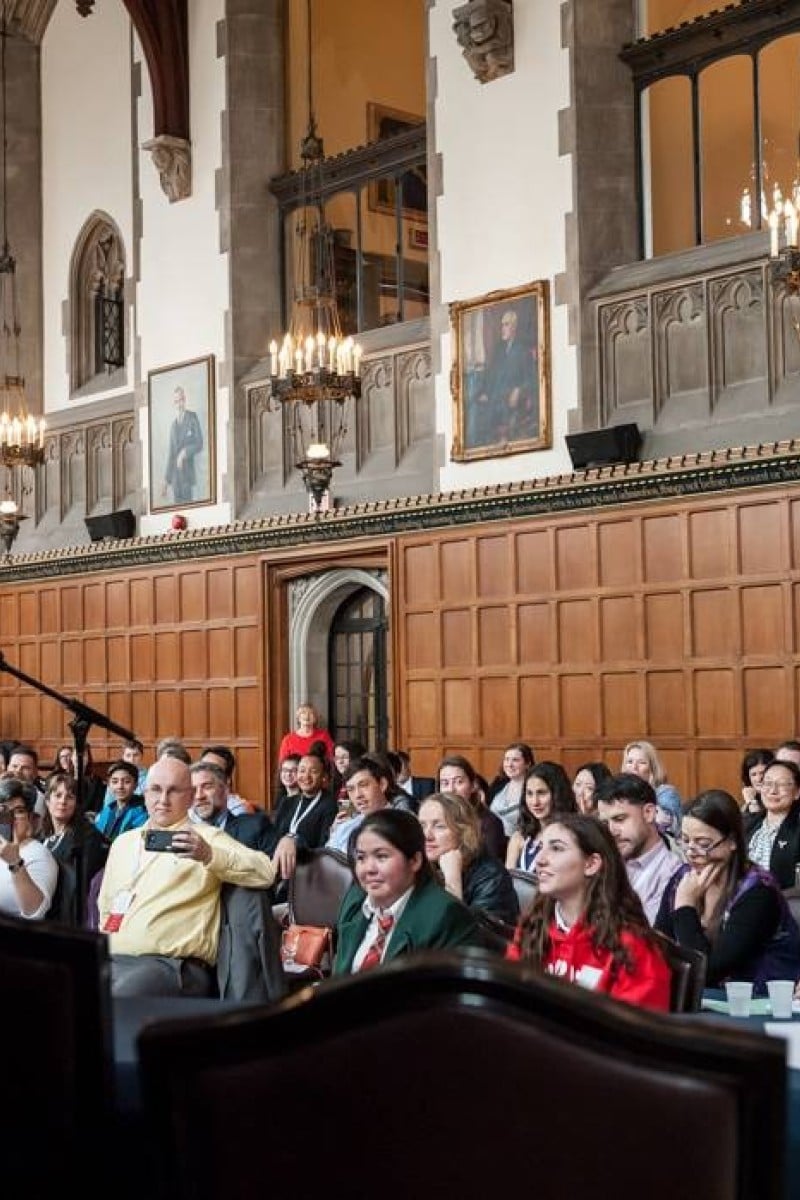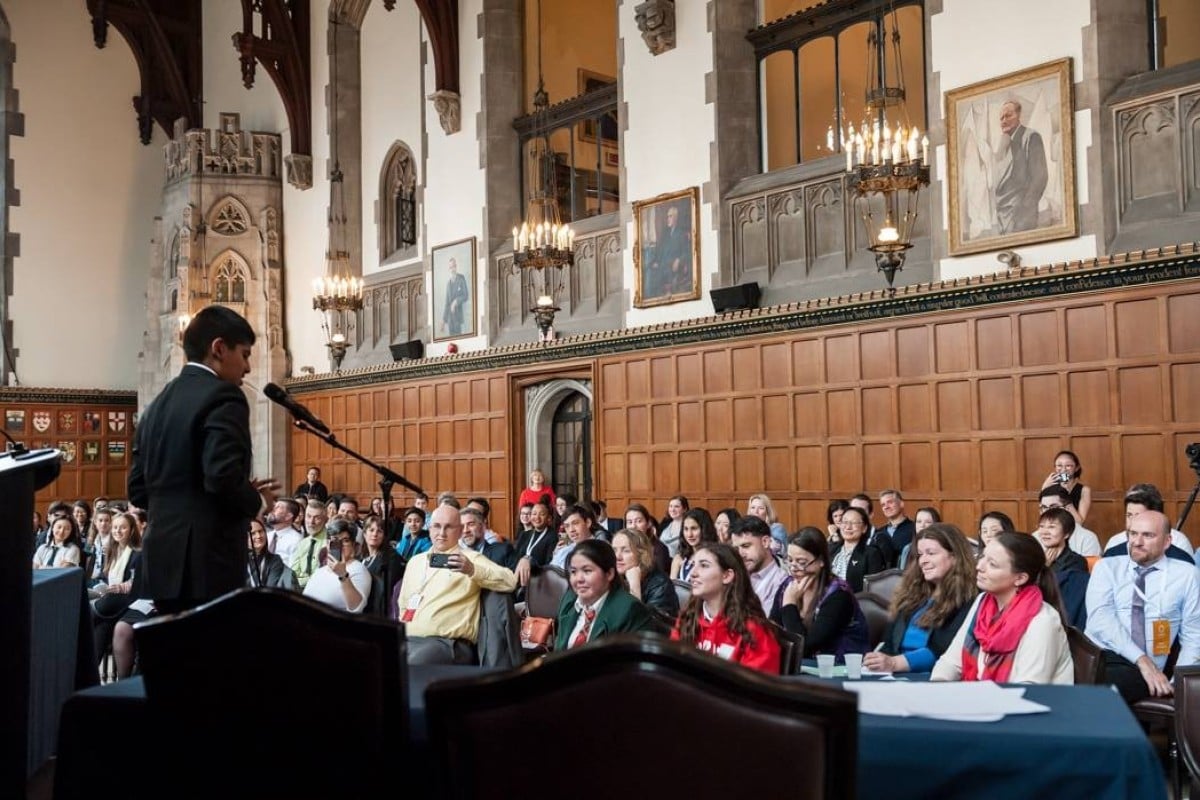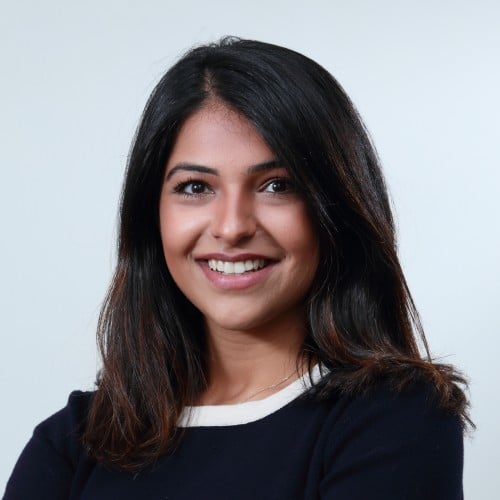
Public speaking world champion Markandeya Karthik on why speeches don’t have to be serious to be powerful
The Renaissance College student wowed at the annual World Individual Debating and Public Speaking Championship with a speech about Donald Trump and other world leaders
 Markandeya entertains the audience with a funny after dinner speech.
Markandeya entertains the audience with a funny after dinner speech. Markandeya Karthik first became involved in public speaking when he was in primary school.
“I needed to deliver a TED-style talk as part of a school project,” he recalls. “Mine was about the importance of vegetarianism.” But while most of his classmates forgot about the project once it was finished, Markandeya was curious to know whether his speech had made an impact. So he carried out a survey.
“I asked [the audience] if they were willing to go meat-free one day a week,” he tells Young Post. To his surprise, 78 per cent said yes.
At that moment, Markandeya realised that public speaking could be a powerful tool to convey opinions, promote ideas, and compel listeners.
Now 15, the Renaissance College student has since become a keen public speaker and debater. He is a member of the Hong Kong Schools Debating and Public Speaking Community, and has won many awards for his speaking skills, including the Junior Public Speaking Championship in the persuasive category.
This April, Markandeya, along with nine other students from Hong Kong, travelled to Toronto, Canada, to take part in the annual World Individual Debating and Public Speaking Championship.
Students from 11 countries competed in five different categories: after-dinner speaking, persuasive speaking, interpretive reading, impromptu speaking, and debate.
“This was the first time I had represented Hong Kong internationally,” he says.
Markandeya won the After Dinner Speech category, becoming world champion in his age group and category.
But he says that the process wasn’t easy. He wrote several drafts of his speech, each time making changes after getting feedback from his coaches and teammates.
“Our team went through a very rigorous training process,” he adds. “Every Sunday, we trained together, gave each other constructive feedback … and helped each other with our techniques.
“You get to a stage where it’s so perfect that it just rolls off the tongue,” he says.
Joan Cho, a WIDPSC coach, told the Hong Kong students that all of their voices mattered. “Young students are somewhat concerned that their take on the world is too juvenile or impractical,” she tells Young Post. “But as coaches, we value the unique perspective they have on world issues.”
Markandeya chose to give a funny speech about the global rise of authoritarian leaders. “After-dinner speeches should be funny with a lot of satire,” he explains. “More than 50 per cent of countries are run by authoritarian leaders, and I feel this issue isn’t given the attention it deserves.”
Despite the seriousness of the topic, Markandeya felt that he would be able to get his message across more effectively through comedy.
“It would be more appealing, and more people would understand the content of the speech, if it was done in a lighthearted way.”
In his speech, he played an authoritarian leader, addressing a group of other authoritarian leaders. The set-up allowed him to be critical without being too heavy-handed.
“I did have a lot of jokes about Trump,” he chuckles.
The biggest challenge was finding the right place to slot a joke or a pun.
“After-dinner speeches are fun, but they also need to inform the public about something,” he says. “So you don’t want to place a joke somewhere it won’t work.”
Markandeya plans to continue with his debating and public speaking, as they have not only helped him grow in confidence, but also brought him new friendships.
“My next step is to prepare for the Hong Kong team trials in November,” he says. “I do want to get onto the team again and compete [in the tournament] again. This time it will be in Shanghai!”
Edited by Charlotte Ames-Ettridge
You may also like:
7 easy steps to help you get over your fear of public speaking
4 tips from an expert that will make you a more confident and talented debater
